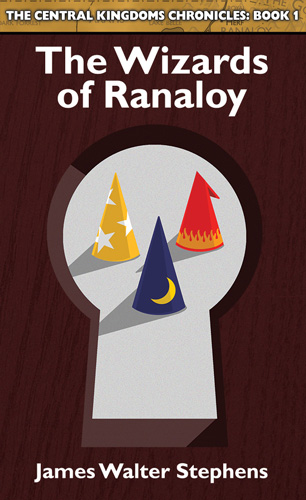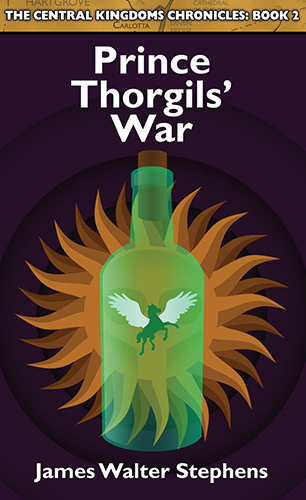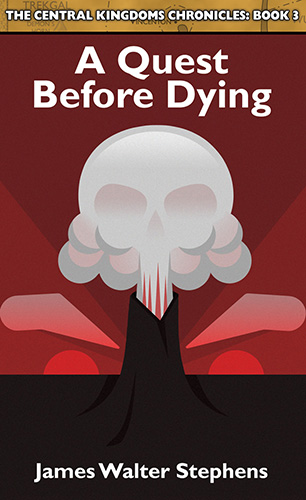Showing 1 - 10 of 28 posts found matching: grammar
Friday 5 April 2024
A random thought while doing the dishes: Why is unwise a word but unsmart isn't?
Unsmart does not appear in the dictionary on my desk, my trusty Webster's New Twentieth Century Dictionary Unabridged (which I still deep into the 21st century because I don't want to grow up, I'll always be a 20th-century kid). Unwise is also nowhere to be seen in either The American Heritage Dictionary, 2nd College Edition we keep upstairs or my copy of The Official Scrabble® Players Dictionary, Second Edition. If it's not in the Scrabble® Dictionary, it's not a real word.
However, the Internet has never cared about reality. Merriam-Webster online recognizes "unsmart" as meaning exactly what you would think it means (i.e. "not smart"), but their example for how to use the word comes from the October 18, 2022 issue of Elle magazine:
Tweets swimming reports from Barton Springs pool; carries an unsmart phone so as not to be distracted by the internet; has lived in France; and read Anna Karenina in 16 hours.
So in this case unsmart means essentially landline. That's nothing like unwise (in word or deed).
Elsewhere, the online Oxford English Dictionary also has an entry for unsmart, going so far as to quote itself when it says "OED's earliest evidence for unsmart is from before 1500, in the writing of Robert Henryson, poet." Curiously, that citation is absent from the Online Etymology Dictionary, but I looked up The Complete Works of Henryson at the University of Rochester's Robbins Library and did find this in the "Prologue" of his 1480s work Fables, lines 22-25:
For as we se, ane bow that ay is bent
Worthis unsmart and dullis on the string
Sa dois the mynd that ay is diligent
In ernistfull thochtis and in studying.
As you can see, that is not English. (Henryson wrote like what he was: a Scotsman.) It's Middle English, where smart had nothing to do with intelligence but a "stinging, sharp pain." In other words, in this case unsmart is akin to relax. I wouldn't say that's unwise either.
So call someone dumb, but don't call them unsmart lest you sound stupid.
Next time: Why is uncharismatic a word but unfortitudinous isn't? Actually, wait. No, this one makes sense. Never mind.
Comments (0) | Leave a Comment | Tags: grammar internet poetry
Monday 4 March 2024
For reasons I won't go into (mainly: vanity), I've recently been re-reading old blog posts. What stands out the most to me is not how damn clever I am (I already knew that) but how I have a real problem typing the word "it's" when I mean "its" and vice versa.
For the record, "its" (no apostrophe) is the possessive form of the traditional gender-neutral singular pronoun, used to demonstrate ownership, as in:
The battle station is heavily shielded and carries a firepower greater than half the star fleet. Its defenses are designed around a direct large-scale assault.
Meanwhile, "it's" (with an apostrophe) is a contraction of the unpossessive, laissez-faire "it" and the present tense third-person singular being verb "is," as in:
The target area is only two meters wide. It's a small thermal exhaust port, right below the main port.
As you can see, despite the its/it's pair being one of the most common confusions in the world of English grammar, I obviously know they're two different words, and I know how they should be used in a sentence (and I've known ever since Star Wars). So why do I so often type one when I mean the other? Is it a birth defect? A mental illness? Keyboard gremlins? I wish I had a better answer than "I'm too lazy to proofread my own posts," but here we are.
Now let's blow this thing and go home.
Comments (0) | Leave a Comment | Tags: grammar star wars wriphe.com
Monday 6 November 2023
I'm proud to report that Wriphe.com has picked up a new reader! According to her email (subject line: "I like your blog!"), Hannah has followed me over from Boosterrific.com and has let me know that she has now read every single Wriphe.com post going back to the beginning in 2003. She might be more dedicated to this site than I am.
Obviously, after reading that much drivel, Hannah has questions. Fortunately, most of her questions are about my favorite subject: me.
Let the self aggrandizement begin!
Why did you start blogging in the first place?
Back in the day — this was before Facebook and smartphones existed, mind you — I was in art school in Athens, GA, and wanted an easy way to keep in touch with friends and family who lived across the country. I do not enjoy A) talking on the telephone or B) repeating myself. So I built a place where anyone who cared to know could come to get critical updates about whatever it was I was doing at the time. I can't say as it worked, really, as only a couple of my friends (and my mother) have ever visited regularly. I still have to answer "what have you been up to?" too often for my personal tastes.
How do you decide what to post about?
At the core, the point of everything that I do is to keep myself entertained. I am very selfish that way.
I come from the land of Lewis Grizzard. (Google him.) Grizzard made a strong impression on a lot of people; many thought he was a real bastard, but my favorite restaurant still has a menu item named after his favorite dish: brunswick stew on a pulled pork barbecue sandwich served with onion rings, I never met him personally, but my encounters with his writings during my formative years led me to believe that one of the best possible occupations was "humorist newspaper columnist." So I generally approach content at Wriphe.com as my own soapbox and diary with a goal of making it an enjoyable read in the (poorly imitated) vein of curmudgeonly satirists like Grizzard or Dave Barry or television's Stephen Colbert or Andy Rooney. (Google him too.) Quoth the Poppins: "A spoonful of sugar makes the medicine go down."
When it comes to creating individual posts, I start by saying to myself, "Oh, shit! I haven't posted anything at Wriphe.com in the past two days!" I picked an every-other-day schedule because it's just often enough to keep me motivated and just long enough to let me regenerate ideas. I ask myself, "Is there anything on my mind?" Sometimes there is, and I type that. And sometimes there isn't, and I stall (or punt).
And some days people ask me a bunch of questions and I answer them.
How long does it take you to craft a blog post?
I wish I was half as clever as I like to think I am. On average, probably about thirty minutes. Honestly, it's probably longer and I just don't want to admit that publicly. Sometimes it takes a very long time, especially for the five paragraph "college admission" essays in which I want to be sure I've gotten all of my punchlines just right. Grammar matters, but so does rhythm and timing. (The core of comedy is subversion of expectations. And banana peels.)
Hannah had more questions than that, but that's a good start. I have to have something to post later, after all. These posts aren't going to blog themselves.
Comments (0) | Leave a Comment | Tags: hannah walter wriphe.com
Thursday 16 December 2021
Today's seasonal grammar lesson: The word 'tis means the same as the word it's. Both are contractions of it is, and in both cases the apostrophe replaces a missing letter i.
When they both first appeared around the 16th century, 'tis meant the same thing it does today, but it's was originally used as the possessive form of the gender-neutral third person singular it. After it's gradually became its (for unclear reasons), it's replaced 'tis (for unclear reasons). Now, if you erroneously type it's when you mean its, someone will snidely correct you in your comments section.
While we're on the subject, 'twas means it was and 'twere means it were, neither of which anyone ever contracts anymore, but I'm starting to think we all should. On the other hand, I think it wise to let 'tbe remain an unwhispered word.
Interestingly, both 'tis and 'twas appear with appropriate apostrophes and modern definitions in the 1806 first edition of Noah Webster's Compendius [a. ſort, brief, conciſe, ſummary] Dictionary. Comparatively, it, its, and it's are entirely omitted. (At least *I* think that's interesting.)
By the way, the only time you can get away with dropping the apostrophe from 'tis and 'twas is if you're playing Scrabble®, but that's because The Official SCRABBLE Players Dictionary© recognizes tis as the "the seventh tone of the diatonic musical scale" and twas as meaning "two." Sorry, Scrabblers, but twere is still not a legally recognized play.
Comments (0) | Leave a Comment | Tags: dictionary grammar
Saturday 18 September 2021
Twitter very helpfully reminds me that today is Batman Day 2021. Explains the site: "Fans pay tribute to the DC Comics superhero on Batman Day, which is celebrated each year on the third Saturday of September." The only problem with that description is that it is not true.
Maybe Batman Day is held on the third Saturday of September since 2018, but it wasn't always. As I have documented elsewhere, Batman Day has been all over the calendar since it was first recognized in July 2014. But that's not the part I'm really bothered by.
The word "fans" in that description is misleading, unless you'd describe the corporations who own the Batman intellectual property as fans. Unlike Star Wars Day, which began as a genuine celebration of its source material before being taken over as a marketing exercise by The Walt Disney Co., Batman Day has never been anything other than a marketing exercise by WarnerMedia.
I wonder if whoever crafted that description for Twitter wasn't having a little fun with the wording. The phrase "pay tribute," which has come to mean a figurative giving of praise, was originally meant quite literally. A tribute is a tax levied on conquered peoples. Give your thanks (and dollars!) to your corporate masters, Bat-fans!
Which is not to say that I don't like Batman or think it's uncool to say how great the Caped Crusader is. I'd just like a little honesty in why we chose today to do it, is all.
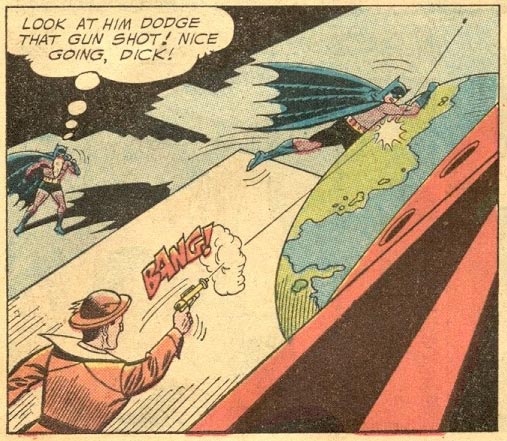
Batman #119, October 1958
Honesty! It's what Batman would want.
Comments (0) | Leave a Comment | Tags: batman comic books grammar holidays rant
Thursday 18 March 2021
Dictionary.com made news this week by defining "supposably" to mean "as may be assumed, imagined, or supposed." That's the same definition typically ascribed to "supposedly" ("according to what is accepted or believed"). There was a time in my life I would have been bent out of shape about this.
Where I come from, "supposably" is not a word. At least, it's not that word. According to my trusty Websters New Twentieth Century Dictionary of the English Language Unabridged (2nd Edition), "supposably" should mean "in a supposable manner." However, it has been used as a mispronunciation of "supposedly" for so long that some 21st-century lexicographers have finally thrown up their hands in defeat.
I have a personal connection to this word because my father has always uses supposably when he means supposedly. In his case, I think he does it because it bothers me. Dad's a real tease that way. (See? It's not my fault. I have been trained to be argumentative by a parent who thinks its fun to fly red flags in front of bulls!)
The reason I'm not a raving basket case over this new definition is because A) I've been reading a lot lately about the bizarre and often counter-intuitive developmental history of the English language, and B) the world is in such a state that if I let myself get worked up over words these days then I'm really going to need to start drinking. The meanings of English words have been meandering for centuries and will continue to do so for so long as someone is still speaking the language. I need to remember that the important part of language is understanding one another, not clinging to arbitrary rules of pronunciation.
That said, I will continue not using "supposably" in my own writing. Even in the 21st-century, a man's got to stand for something.
Comments (0) | Leave a Comment | Tags: dad dictionary family grammar rant supposably walter
Monday 18 June 2018
Sadly, these shorts were sold out by the time I spotted them on DHGate.com* at the bargain prices of $2.68 (with free shipping!):

*DHGate, for those of you who don't live on the Internet, is an online marketplace like Amazon.com for Chinese manufacturers seeking to unload surplus goods to resellers. This is where sweatshops sell their knockoff shoes after they've fulfilled their orders for Ivanka Trump. For example, compare these shorts with the $14.99 pair you'll find from SuperHeroStuff on Amazon.com.
And while I do want to wear Superman's shorts, I post this pic mainly because of the delightful Engrish catalog text.
CUSTUMES INSIDE TO WEAR
Give you the most suitable underwear, wear make you confidence. I
of you in the other half of the face, not inferior, to give you strength to master everything.
It takes a Superman to understand what that is trying to say.
Comments (2)
| Leave a Comment | Tags: catalog grammar superman underwearMonday 2 October 2017
While checking for news from the aftermath of Sunday's game between the New Orleans Saints and the Miami Dolphins in London, my phone returned this.
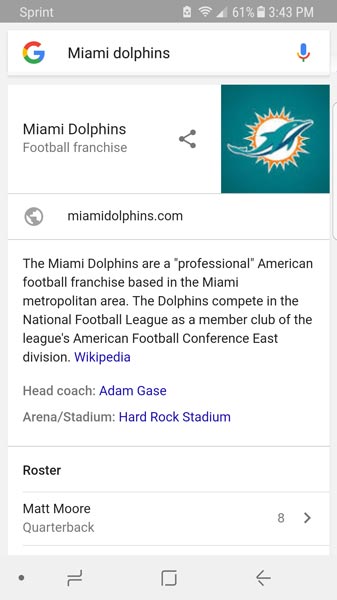
Some people don't know when or how to use quotation marks. Most of the time, they should be used when directly quoting someone, such as dialog in novels or citing from sources in news stories. The difference is clear in Jay Cutler said I suck, and Jay Cutler said, "I suck".
Quotation marks can also be used to prevent confusion when referencing a word or phrase itself and not its meaning. You can see what I mean in Jay Cutler prefers "dicks."
And, of course, there's a third use for quotation marks: denoting irony or sarcasm.
On Sunday, the Dolphins lost 20-0. The were shut out by the Saints, a team with a nearly historically bad defense. The highlight of the game was when Jay Cutler actively refused to participate in a Wildcat play. The petulant quarterback stood on the field with his hands on his hips and watched his team lose three yards on yet another drive that would end with a punt. With quality teamwork like that from its quarterback, no wonder the Dolphins are one missed field goal away from being 0-3.
Coach Adam Gase deciding to pay Jay Cutler $10 million instead of starting Matt Moore may prove to be the worst decision of his young head coaching career. Maybe not Nick Saban choosing Daunte Culpepper's knee over Drew Brees' shoulder bad, but not too much worse.
As you can see, the writer of that Wikipedia entry knew what he was doing.
Comments (0) | Leave a Comment | Tags: adam gase daunte culpepper dolphins dolphins quarterbacks suck football grammar jay cutler matt moore nick saban wikipedia
Thursday 24 August 2017
The September issue of Reader's Digest includes an excerpt from Ben Bratt's book Nabokov's Favorite Word is Mauve. In typical clickbait fashion, the magazine titles its article "Have Bestsellers become Dumber?" There's a maxim in journalism that any question posed in a headline can be answered with the word "no." In this case, the answer is a slightly more complicated "kind of."
The argument Bratt makes is that most bestselling books these days are written on a 6th grade reading level, a significant decline from the 8th grade reading level of most bestsellers half a century ago. Personally, I hesitate to blame this on the "dumbing down" of readers. As a child, I was taught that any writing intended for a mass audience should be written on a 7th grade level. I suspect that modern authors have taken that advice to heart and, in the interest of finding an audience, doubled down. After all, if a 7th grade level reaches the average reader, a 6th grade level casts a wider net.
Of course, reading this made me wonder about my own books. Now that I'm an author myself, where does my personal style fall? To answer that question, I took my first three books and ran them through an online text parser. It gave me an "A" for readability but complained that my words have too many syllables. I didn't realize that was a problem. Perhaps naively, I assumed that words had all the syllables they needed.
Over the course of the three books (255,437 words in 25,235 sentences), I averaged 1.4 syllables per word. That's too high? I like Green Eggs and Ham as much as the next guy, but I also like most of my meals to be slightly more complicated.
Otherwise, what did the text parser tell me about my writing? My books are 37% nouns or pronouns, 21% verbs, 7% adjectives, and 6% adverbs, and they should take about 20 hours to read. That information gives no hint about whether my stories are entertaining, just that humans won't pull out their hair trying to make sense of my grammar. That's better than nothing, I suppose.
Oh, it also told me that my writing averages a 7th grade reading level. Surprise, surprise.
Comments (2)
| Leave a Comment | Tags: a quest before dying books prince thorgils war statistics the wizards of ranaloy walter workThursday 26 March 2015
It seems that everywhere I turn these days, I'm hearing more and more of my current least-favorite word: "unbelievable."
Once upon a time, impressive feats of athleticism were "unbelievable." Then Internet service for $29.95 a month became "unbelievable." Now discovering that a forty-ton airplane won't stay airborne unless someone is really paying attention is "unbelievable."
To those of you who sprinkle the word into your daily lives, I do not think it means what you think it means. Merriam Webster describes "unbelievable" to mean "too improbable for belief." The definition includes vampires or peace in the Middle East but not delicious doughnuts or a coach's decision to pass instead of run.
There really aren't that many things we come across in the physical universe that are unbelievable. Infinity? God? That Kim Kardashian makes $28 million per year? Those are unbelievable.
If you literally are incapable of believing the things your eyes are showing you, it's not that those things can't be imagined, it's that you have no imagination. Personally, that is something I find pretty unbelievable.
Comments (0) | Leave a Comment | Tags: dictionary grammar rant unbelievable walter


